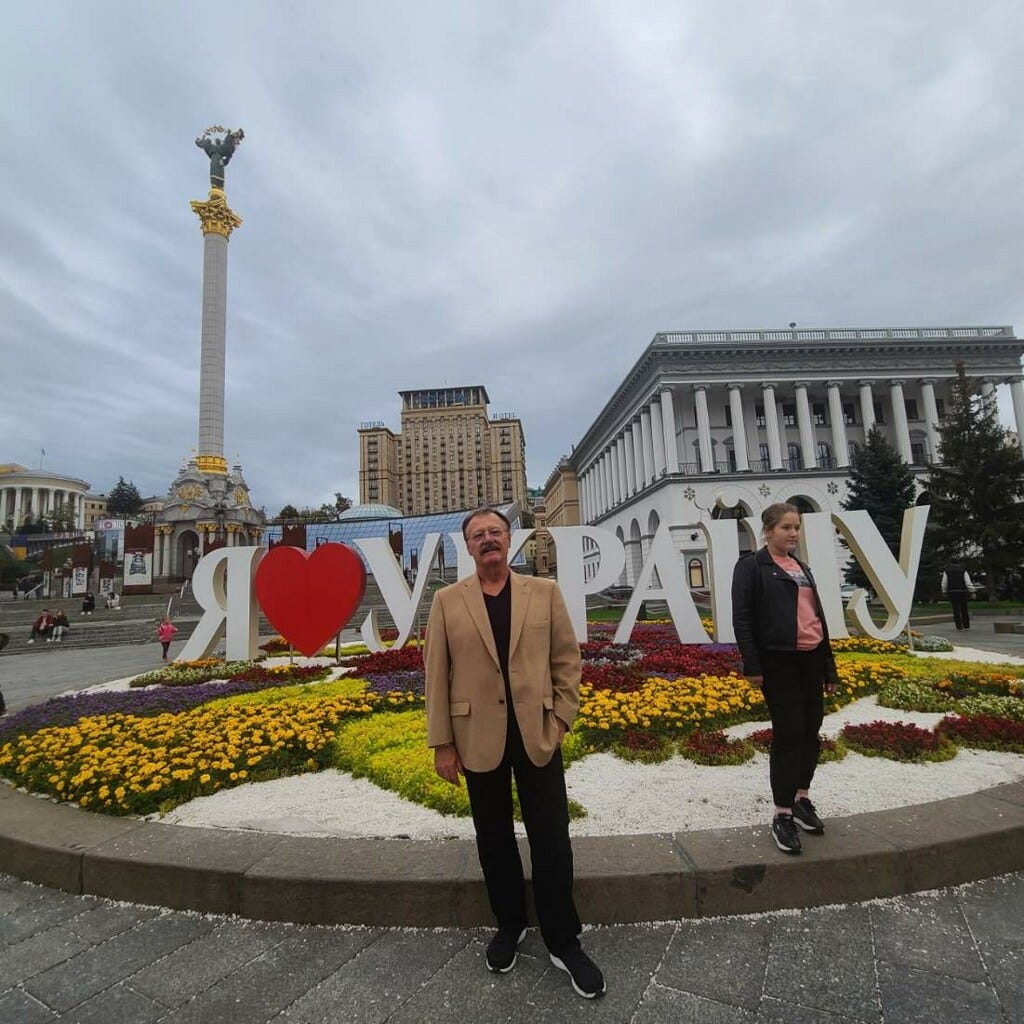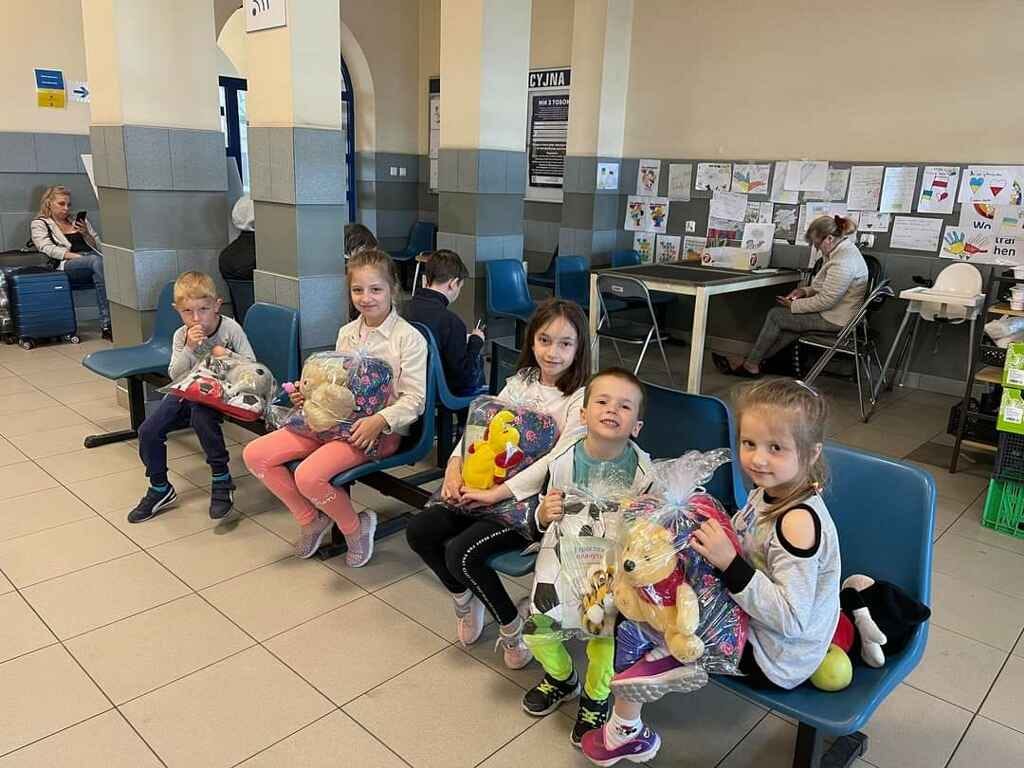Beauty and war collide during Laramie pediatrician’s adventure in Ukraine
Dr. Kent Kleppinger volunteered his medical talents in Kyiv, taking in the culture of a city where reminders of war are ever-present. Now, he’s gathering supplies for refugees and premature babies.
Laramie pediatrician Dr. Kent Kleppinger spent two weeks this fall in the war-torn country of Ukraine, lending his medical talents to its children and families as the Russian invasion drags on.
Kleppinger shared the story of his travels during a lecture Wednesday at the University of Wyoming. Struck by the beauty of its capital and the hardiness of its people, Kleppinger urged others to do whatever they can for the besieged country.
“Someday, you will have an impulse to do something — and before the second impulse comes and tells you, ‘Don’t do it, that’s crazy, that’s stupid,’ do it,” he said. “Ignore that impulse and just do it.”

Stateside once again, Kleppinger is now raising funds for two locations he visited: A refugee center in Lublin, Poland and the Kyiv Neonatal Intensive Care Unit in the country’s capital city.
Despite its distance from the frontlines, the city — like all of Ukraine — is under constant threat of attack via cruise missile. Kleppinger saw the impacts of the war during his time in Kyiv and came face-to-face with the challenges it presented to the county’s children.
The war is officially in its eighth year — having started with Russia’s annexation of Crimea in 2014 — but the conflict escalated significantly last February when Russia launched an all-out invasion. Since that escalation, some 100,000 soldiers on each side have been killed or wounded, while Ukraine has suffered another 40,000 civilian casualties.
Getting to Ukraine: No easy feat
Kleppinger has no family in Ukraine and no other personal ties. But since the February invasion, Ukraine has captured the world’s attention — with its steadfast defiance of Russia, its geopolitical significance to Europe, and its pleas to the world at large for aid. More than 5,500 miles from Kyiv, Dr. Kleppinger decided to help.
He called the country’s health department to figure out what paperwork he would need, assuming there would be an arduous bureaucratic process to complete before he could do medical work in a warzone.
Eventually, Kleppinger spoke with the deputy minister of health.
“I go, ‘How do I do this?’ He goes, ‘Just come,’” Kleppinger recalled. “I said, ‘No really, do I need special papers to come in?’ ‘No, just come.’”
The logistics of physically traveling there proved trickier. Kleppinger flew from Dallas to Frankfurt to Warsaw before eventually landing in Lublin, Poland. From there, he rented a car, hoping to drive the remaining five hours into Ukraine. He was initially delayed by a line of trucks several miles long, each trying to cross the border with supplies. He changed routes and eventually reached the border, but he was stopped there by armed border guards.
“The U.S. said do not go to Ukraine. Period. Don’t go,” Kleppinger recounted. “And here I am, I haven’t told the State Department that I’m going to Ukraine because I think they’re going to put a little sign up at the border saying, ‘Catch him and kick him out.’ I thought, ‘Oh, here it comes.’”
In fact, the border guards had no issue with Kleppinger entering the country; like so many others during Kleppinger’s travels, they welcomed the pediatrician.
It was the rental car that wasn’t allowed to cross the border. So Kleppinger was sent back to Lublin, feeling defeated and nearly ready to call it quits.
But after several days of travel, he found himself in Lublin Train Station, waiting for the engine that would take him to Ukraine.

The train station is home to a refugee center, where Polish citizens welcome Ukrainian refugees — many of them families with children. Kleppinger met many of these refugees, as well as the center’s administrators.
He learned that the center hosted as many as 2,000 refugees a day at the outset of Russia’s invasion. That number had fallen to about 200 a day, but funding had fallen off as well. So Kleppinger found himself at a refugee center stretching its limited resources to offer displaced Ukrainians a place to sleep, food to eat, education, counseling, toys for the children and help with the resettlement process.
“Now that it’s winter, (the number of refugees) is starting to go back up because there’s no electricity in half the country,” Kleppinger said.
It took a total of four days to arrive in Kyiv, but Kleppinger made it.
Working in Ukraine: Beauty meets war
Dr. Kleppinger didn’t offer up many details about the children he attended in Kyiv; he wasn’t even allowed to take pictures of the hospital.
Ukrainian UW student Anastasiia Pereverten said during Kleppinger’s lecture that Russia has used photos or videos posted to social media to plan cruise missile strikes, identifying military or infrastructure targets in the background of innocuous posts.
Dr. Kleppinger said he saw around 200 children during his two weeks in Kyiv, frequently working nine-hour days. He was struck by the way Ukrainian children were dressed up nice for doctor’s visits — and a little embarrassed by the clout he got for being “an American doctor.”
The medical professionals in Kyiv didn’t have the glut of specialized equipment found in most hospitals throughout the United States, but they also relied more on the “clinical” approach that Kleppinger said he prefers — seeking whenever possible to diagnose or treat illnesses without relying on expensive tests, lab draws and equipment.
But there were specific areas that could benefit from new equipment, hospital administrators told him.
“All of their incubators, except for one, were damaged,” Kleppinger said. “Because 12 times a day, they have to run them eight stories down to the basement where the bomb shelter is because an air siren goes off.”
Kyiv is not on the frontlines. It is, in fact, quite far from the major fighting in the south of the country. But it has been subject to missile attacks, and Kleppinger said it has very clearly been touched by war.
The pediatrician spent his off hours wandering Kyiv, checking out the theaters, shops and cathedrals that define the city, stopping frequently for Ukraine’s world-class coffee — a treat one can find around every corner in the capital city, Kleppinger said. The rich pastel colors of the city’s Baroque and Victorian architecture were punctuated by evidence of war — statutes protected by sandbags, makeshift memorials to young people lost in battle, and large displays of Russian tanks and war machines, wrecked by Ukrainian weapons and captured by Ukrainian soldiers.
“You’d see stuff that was so beautiful and you’d turn a corner and see barriers or barbed wire,” Kleppinger said. “You see that all over the capital.”
Back in Laramie: The fight continues
Throughout his adventure in Ukraine, Kleppinger said he encountered no shortage of friendly faces. The people of Ukraine (and Poland) helped him find his way, catch his trains, and make it around a foreign city where Kleppinger didn’t speak the language.
Having returned to Laramie, Kleppinger hopes to aid the people who aided him.
“We are starting two opportunities to help the people in Ukraine who are really making a big difference in the comfort and care of children and their immediate families,” the doctor writes on his Laramie Pediatrics website.
The two opportunities include:
Donating items for the Lublin Refugee Center in Poland. Donors can drop off pillows, sheets, blankets, coloring books and colored pencils at the Laramie Pediatrics Office at 1252 N. 22nd Street. When the office hits a “good supply” of these items, they will send them to Poland.
Fundraising for high flow neonatal nasal cannulas — medical equipment that keeps premature babies off of ventilators and was specifically requested by the neonatal ICU in Kyiv. Those wishing to donate can support the NICU and the refugee center by donating to Kleppinger’s GoFundMe campaign. The pediatrician said he would also like to host educational seminars for pediatric doctors in Ukraine.
At the time of this writing, the campaign has already raised $4,200 — including three donations of $1,000 each.
Safely at home once more and despite the travel difficulties, Kleppinger said he would return to Ukraine in a heartbeat if he could.
“Someday when all this is over, go visit this country,” Kleppinger told his audience Wednesday. “If you’re thinking of going to Italy or France or Germany, that’s cool, but go to Ukraine. It’s a beautiful country. They are wonderfully nice, gentle, kind people who only want to be left alone.”



